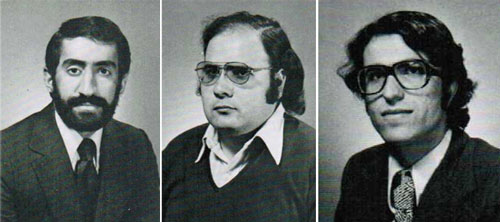
When I came to Huntington College in 1975, we had three students from Iran. This was four years before the Ayatollah Khomeini overthrew the Shah in February 1979 (the US embassy was seized in November 1979). I’ve wondered what happened to Parvis, Ramez, and Sammy.
Parvis is the one I remember most vividly. He had an exuberant personality–fun-loving, big laugh, big smile. And smart, evidently, since he graduated with a degree in Philosophy. Everyone liked him. Soon after my freshman year started, he pledged with the Alpha Sigma Eta fraternity. He was a great sport throughout the two weeks of initiation.
I remember hearing Parvis talk once about Iran. He was very proud of his country. He mentioned how progressive, how modern, it was amidst the other Middle-Eastern countries. And he emphasized that Iran was very pro-American. He felt Iran was an important, strategic friend of the United States.
 Ramez, who graduated the same year with a Biology degree, was quiet and kept a low profile. My only real memory of him involves the freshman slave auction: he bought me, Steve Barber, and Brad Carpenter, and took us out to do yardwork at the home of Dr. Fred Morgan, a biology professor.
Ramez, who graduated the same year with a Biology degree, was quiet and kept a low profile. My only real memory of him involves the freshman slave auction: he bought me, Steve Barber, and Brad Carpenter, and took us out to do yardwork at the home of Dr. Fred Morgan, a biology professor.
As for Sammy (left)–I have no memories of interactions with him. He didn’t return the next year.
So what happened to these guys? Were they back in Iran in 1979 in time for the revolution? If so, which side did they take? Did they endure hardship for having attended a Christian college in the United States? Or, having experienced some American idealism, did they sympathize with Khomeini against the repressive Shah of Iran (a fairly decent dictator, as dictators go, but still a dictator who committed human rights abuses as he silenced dissent).
It’s quite possible they stuck around in the States for graduate work. Maybe they’re still here. Or maybe they went back long ago, and now only have distant memories of Huntington University. Maybe they fought, perhaps died, in the lengthy war with Iraq. Or maybe they are living normal lives in Iran, and, having lived among Americans,get questions about Abu Ghraib and George Bush’s defense of torture, and why the US views them as such an evil country. If so, how do they respond?
I don’t know. I just have questions, and wonder.





